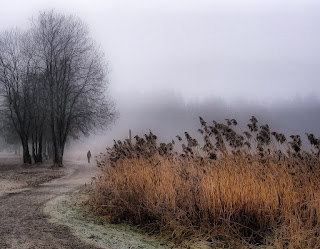Late November days and Stir-up Sunday
The annual cycle of the Church’s year now ends with the Feast of Christ the King. The year that begins with the hope of the coming Messiah ends with the proclamation of his universal sovereignty. The ascension of Christ has revealed him to be Lord of earth and heaven, and final judgement is one of his proper kingly purposes. The Feast of Christ the King returns us to the Advent theme of judgement, with which the cycle once more begins.
So says Common Worship: Times and Seasons about the Sunday before Advent. It all sounds so busy. Frenetic. Loud. Hectic. November has been a busy ecclesial month, with All Saints' Day and Remembrancetide. In the United States, the month ends with Thanksgiving. The festive season is fast approaching. Do we really need a quite artificial feast foisted upon a Sunday in late November?
We have celebrated the kingship of Christ on Ascension Day and the Sunday after Ascension Day. This ensures that the kingship of Christ is rightly celebrated in the context of the paschal mystery rather than against the background of the political delusions of a Roman pontiff in 1925.
On Advent Sunday we will turn towards "the last day, when he shall come again in his glorious Majesty to judge both the quick and the dead". Doing so, we are reminded that the majesty and kingship of Christ cannot be used as a convenient means of promoting reactionary or revolutionary fantasies, or comfortable centrist platitudes, for we shall all - "both the quick and the dead" - stand before the Judge, our pretensions exposed, our earthly boasts and claims turning to dust.
No, we do not need this artificial feast on the Sunday before Advent. Something quieter, something more modest is much more fitting.
November, says the contemporary poet Christopher Yokel, brings the "dying flames of autumn". By late November, autumnal colours have gone. The trees stand stark and bare. The days are colder, darker. Those "dying flames" of the season stand as a reminder of both our own mortality and our dependence on the Author and Giver of life, without whom we can bear no fruit.
A festival of Christ's kingship at such a time - with Remembrancetide just finished and Advent about to commence - seems misplaced, striking a rather discordant, triumphalist note. It is a time to pray that we might be prepared for Advent and the festive season, even as our souls reflect the bare landscape of November and its colder, darker days.
It is, then, a time to pray "Stir up, we beseech thee, O Lord, the wills of thy faithful people". A time to hear the prophet Jeremiah declare that Yahweh will bring "the seed of the house of Israel out of the north-country, and from all the countries whither I had driven them", readying us to sing in Advent darkness "O come, O come, Emmanuel, And ransom captive Israel".
And as the bare landscape of late Autumn gives way to Winter, as we prepare for the demands of the festive season, it is a time to pray that we may "plenteously bring forth the fruit of good works". A time to hear that we are fed in the wilderness of this world by the One who is "that Prophet that should come into the world", hinting at the place to which we "in heart and mind" shall soon journey, the House of Bread.
There is a deeply rooted quality to Stir-up Sunday: rooted in the Prayer Book tradition and the Anglican experience over centuries; rooted in the ancient excita prayers of the Western liturgy; rooted in these dark, cold days of late November; rooted in the cultural memories of this Sunday before Advent. This rootedness enriches the prayer and observance of Stir-up Sunday, contrasting with the abstract nature of a feast of Christ the King, itself created in rather dubious circumstances in 1925 and moved to late November only in 1970 as a way of ending the liturgical year.
Perhaps part of the reason for the loud and frenetic nature of the feast of Christ the King on the Sunday before Advent is this lack of the rooted character of Stir-up Sunday. It has to be loud and brash: how else is an artificial feast to establish itself?
The Sunday before Advent, however, is surely a time for a quieter liturgical moment.
A quieter liturgical moment which allows us to gather ourselves after a November filled with "For all the saints" and "O God our help in ages past".
A quieter liturgical moment as we stand on the cusp of Advent.
A quieter liturgical moment, echoing the growing silence of the late Autumn landscape.
A quieter liturgical moment, not dominated by a loud and brash feast, but giving space to pray "Stir up, we beseech thee, O Lord".




Comments
Post a Comment